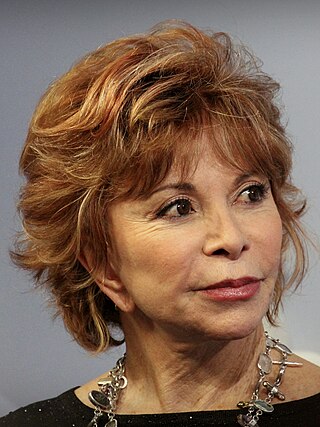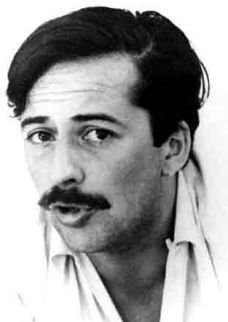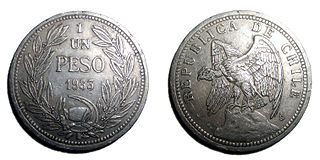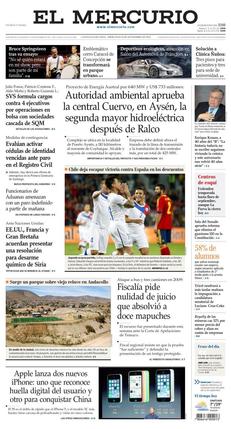
Salvador Guillermo Allende Gossens was a socialist politician, who served as the 28th president of Chile from 1970 until his death in 1973. As a democratic socialist committed to democracy, he has been described as the first Marxist to be elected president in a liberal democracy in Latin America.

Isabel Angélica Allende Llona is a Chilean writer. Allende, whose works sometimes contain aspects of the genre magical realism, is known for novels such as The House of the Spirits and City of the Beasts, which have been commercially successful. Allende has been called "the world's most widely read Spanish-language author." In 2004, Allende was inducted into the American Academy of Arts and Letters, and in 2010, she received Chile's National Literature Prize. President Barack Obama awarded her the 2014 Presidential Medal of Freedom.

Eduardo Nicanor Frei Montalva was a Chilean political leader. In his long political career, he was Minister of Public Works, president of his Christian Democratic Party, senator, President of the Senate, and the 27th president of Chile from 1964 to 1970. His eldest son, Eduardo Frei Ruiz-Tagle, also became president of Chile (1994–2000).

The 1973 Chilean coup d'état was a military overthrow of the Popular Unity government in Chile led by the democratic socialist Salvador Allende as president of Chile. Allende, who has been described as the first Marxist to be democratically elected president in a Latin American liberal democracy, faced significant social unrest, political tension with the opposition-controlled National Congress of Chile, and economic warfare ordered by United States president Richard Nixon. On 11 September 1973, a group of military officers, led by General Augusto Pinochet, seized power in a coup, ending civilian rule. In 2000, the CIA admitted its role in the 1970 kidnapping of René Schneider, who had refused to use the army to stop Allende's inauguration. 2023 declassified documents showed that Nixon, Henry Kissinger, and the United States government, which had branded Allende as a dangerous communist, were aware of the coup and its plans to overthrow Allende's democratically-elected government.

Miguel Humberto Enríquez Espinosa was a physician and a founder of the Chilean Marxist-Leninist urban guerrilla Movement of the Revolutionary Left (MIR), founded in 1965. He was General Secretary of the MIR between 1967 and his death in 1974.

Salvador Allende was the president of Chile from 1970 until his suicide in 1973, and head of the Popular Unity government; he was a Socialist and Marxist elected to the national presidency of a liberal democracy in Latin America. In August 1973 the Chilean Senate declared the Allende administration to be "unlawful," Allende's presidency was ended by a military coup before the end of his term. During Allende's three years, Chile gradually transitioned into a socialist state.

The nationalization of the Chilean copper industry, commonly described as the Chileanization of copper was the process by which the Chilean government acquired control of the major foreign-owned section of the Chilean copper mining industry. It involved the three huge mines known as 'La Gran Mineria' and three smaller operations. The Chilean-owned smaller copper mines were not affected. The process started under the government of President Carlos Ibáñez del Campo, and culminated during the government of President Salvador Allende, who completed the nationalization. This "act of sovereignty" was the espoused basis for a later international economic boycott, which further isolated Chile from the world economy, worsening the state of political polarization that led to the 1973 Chilean coup d'état.

María Isabel Allende Bussi is a Chilean politician and the youngest daughter of former Chilean president Salvador Allende Gossens, the first and till today last legally elected Marxist president in world history.

El Mercurio is a Chilean newspaper with editions in Valparaíso and Santiago. Its Santiago edition is considered the country's newspaper of record and it is considered the oldest daily in the Spanish language currently in circulation. El Mercurio is owned by El Mercurio S.A.P., which operates a network of 19 regional dailies and 32 radio stations across the country.

The Fatherland and Liberty Nationalist Front was a Chilean fascist, political and paramilitary group that fought against the democratically elected Popular Unity government of Salvador Allende, in Chile.

On September 11, 1973, Salvador Allende, President of Chile, died from gunshot wounds during a coup d'état led by General Augusto Pinochet, commander-in-chief of the Chilean Army. After decades of suspicions that Allende might have been assassinated by the Chilean Armed Forces, a Chilean court authorized the exhumation and autopsy of Allende's remains.

Parliamentary elections were held in Chile on 4 March 1973, They resulted in a victory for the Confederation of Democracy, an opposition alliance led by the National Party and the Christian Democratic Party. However, they were unable to secure the necessary two-thirds majority in the Senate to remove President Salvador Allende from office.

Cardenal Caro Province is one of the three provinces of the central Chilean region of O'Higgins (VI). The capital of Cardenal Caro is Pichilemu.

Chilean-Mexican relations are the historical and current bilateral relations between the Republic of Chile and the United Mexican States. Both nations are members of the Asia-Pacific Economic Cooperation, Community of Latin American and Caribbean States, Latin American Integration Association, Organization of Ibero-American States, Organization of American States, Organisation for Economic Co-operation and Development, Pacific Alliance and the United Nations.

Teatro Caupolicán is a theatre and music venue located on the San Diego street in Santiago, Chile. It was opened in 1936. During its long history has hosted sporting, political, and cultural events. Currently is an important concert venue for popular Chilean and international artists, with a seating capacity of 4,500 and a total capacity of 5,400.

Project Cybersyn was a Chilean project from 1971 to 1973 during the presidency of Salvador Allende aimed at constructing a distributed decision support system to aid in the management of the national economy. The project consisted of four modules: an economic simulator, custom software to check factory performance, an operations room, and a national network of telex machines that were linked to one mainframe computer.
Events in the year 1973 in Chile.
The following lists events that happened during 1970 in Chile.
The following lists events that happened during 1972 in Chile.
Cardenal Caro Department was one of the departments of Chile located in Colchagua Province.














